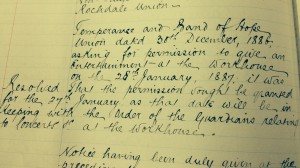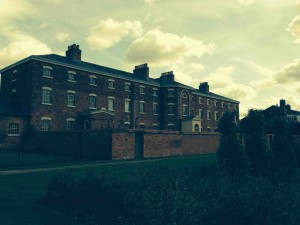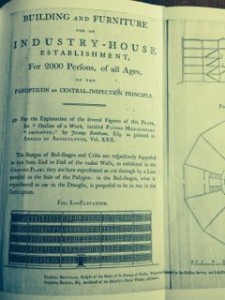Poor law
Audible and voluble expressions – part 2 (1887)
Post by Jenny Hughes I’ve been researching theatrical entertainments in Victorian workhouses, and have come across an extraordinary range of work that might be described as ‘fledgling’ social theatre from the 19th century, from missionary and temperance theatricals to solidarity and charity performances by popular performers, to amateur performances by […]
‘The Beggar’s Theatre’ (1931)
Post by Jenny Hughes Somebody recently showed me an interesting account of a poor theatre from a book about theatre audiences published in 1931. The book, called Gallery unreserved written by ‘A Galleryite’, offers a series of revelatory anecdotes about the views, feelings and experiences of those who queued for the ‘cheap seats’ in […]
Pop up paupers, pathways and pauper mice at the Workhouse, Southwell
Post by Jenny Hughes On Sunday 24th August I went with Carran Waterfield from Triangle Theatre to the Workhouse at Southwell (Nottinghamshire). The workhouse was bought by the National Trust in 1997 and renovated with loving care and no expense spared to a condition as close to the original as possible, opening […]
‘Sinking stages’ – Jeremy Bentham and the education of pauper children
Post by Jenny Hughes Jeremy Bentham (1748-1832), famously Liberal and utilitarian, is perhaps best known for his advocacy of ‘panopticon’ architectures for prisons, asylums, hospitals and schools. A panopticon is a circular building, with cells on an outside perimeter and an inspection tower in the centre. They are constructed according […]
Songs and recitations in the workhouse (2) – ‘Home Sweet Home’
Here is another post on songs and recitations in the workhouse (relating to the performance of the Orpheus glee club at the opening of Dearnley workhouse in Rochdale in 1877 – see ‘Songs and recitations in the workhouse – ‘A Fine Old English Gentleman’ blog post below). Given that we […]
Songs and recitations in the workhouse – ‘A Fine Old English Gentleman’
Post by Jenny Hughes As noted in ‘The only way is Rochdale 3’ (blog post below) – the Orpheus Glee club performed at the opening of Dearnley workhouse in Rochdale and at the Christmas treat for paupers that followed a week or so later, and their repertoire may have included […]
Training the pauper child – musical performance
Post by Jenny Hughes Musical performance – singing, playing an instrument, performing in an orchestral or brass band – was a core part of the educational curriculum for the poor child in the 19th century. Musical performance was seen as a means of personal and social education and a disciplinary […]
The only way is Rochdale (3)
Post by Jenny Hughes To return to the records of entertainments taking place in Dearnley workhouse in Rochdale during the final third of the 19th century (see previous posts – The only way is Rochdale 1 and 2). I found at least one entertainment for each month of the years […]
The only way is Rochdale (2)
Post by Jenny Hughes I’ve been looking at records of entertainments in Dearnley workhouse in Rochdale, from its opening in 1877. This has meant looking at huge, heavy, dusty, crumbling minute books kept by the Board of Guardians and various workhouse committees – minute books are full of beautiful handwritten […]
The only way is Rochdale (1) …
Post by Jenny Hughes One of the ways I am taking this research forward is to focus on a specific locality – Rochdale in Lancashire, home of the Rochdale Pioneers and the cooperative movement, and a centre of Chartist fervour leading up to and around the period of the Reform […]




